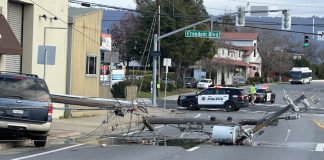By Frances Salgado-Chavez
Racism didn’t end with Dr. Martin Luther King Jr.’s ‘I have a dream’ speech in 1963. Further, his critiques of the United States government as the ‘greatest purveyor of violence in the world’ led to his assassination. Racism is alive and the U.S. remains a global leader in military spending, mass incarceration rates, police brutality and now Covid-19 cases—all of which disproportionately affect people of color. Equity has never been granted to people of color and we have always fought for our rights. MLK Jr. believed in nonviolent protest, but his analysis of the forms of violence that affect the well-being of our country, people of color and those in poverty, were radical for its time. This pushback for change is visible with the treatment of several community members in identifying the violence of the bust. In attempting to explain this history, community members endured unacceptable behavior from pro-busters.
The incidents that occurred were as follows: first, a few pro-busters who showed up to one of our first sit-ins told us to ‘go back to Mexico.’ Second, a truck that passed by yelled ‘white power’ and a crowd of pro-busters yelled ‘white power’ back. Third, there was a minor who was dressed as a boogaloo (a right extremist white supremacy group) and posed for a photo with the “okay” used to discreetly gesture “white power.” It was not only the behavior of the pro-busters, but the way the Parks and Recreation department handled the situation.
The Parks and Recreation department made the process long with preferential treatment toward the leader of the pro-busters, ex-Watsonville Chief of Police Manny Solano. Community members attended three meetings and voiced their opinions through calls, emails and public comment. Although the community had spoken, the Parks and Recreation Department, not the commissioners, chose to dismiss all previous concerns by solely focusing on the survey. The commissioners: Jessica Carrasco, Paul De Worken, Brandon Sencion and Ana Hurtado listened to the community by giving their recommendation of moving the bust to another location.
The argument I have heard from pro-busters is that Washington was a founding father, that he ‘fought for our freedom,’ was a ‘flawed human being’ and ‘ultimately freed his slaves.’ Yet, what is not being considered is that to ‘found’ the United States he had to violently displace indigenous people, and the ‘freedom’ he fought for was solely for white men. It is true, all humans are ‘flawed,’ but most people do not lead massacres and enslave people. What Washington did was create the groundwork for systems and institutions of systematic violence that MLK Jr. would later go on to critique.
I will be outlining examples of Washington’s intent to massacre and enslave Native Americans: In 1789, he believed the U.S. had sovereignty over what would be Ohio and stated to “extirpate, utterly, if possible” the indigenous peoples who pushed against the settlement. From June to December, 40 Indian settlements in the Iroquois nation were massacred under Washington’s command and thousands of their plantations were devastated. Also, he owned 300 African slaves and intentionally shuffled them around so he wouldn’t have to free them.
Most of the pro-busters are scared of change. I want to let them know that change is okay even if it’s scary. We would like the bust to be removed and replaced with an artwork that better represents Watsonville. Here is another MLK Jr. quote that better represents him: “The ultimate measure of a person is not where one stands in moments of comfort and convenience, but where one stands in times of challenge and controversy.”
Frances Salgado-Chavez is a Watsonville resident. Her views are her own, and not necessarily those of the Pajaronian.
The Pajaronian welcomes letters. Letters and columns may be dropped off or mailed to The Pajaronian, 21 Brennan St., Suite 18, Watsonville, CA 95076. Letters and columns may also be sent via email to tn****@********an.com. Letters should be less than 300 words, and columns are no more than 700 words. All letters and columns must be signed and have an address and phone number for confirmation purposes. We reserve the right to edit and condense all submissions.









